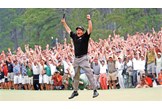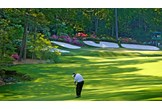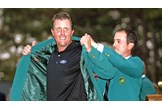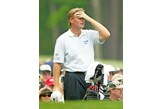Interview: Phil Mickelson
Published: Last updated:
When Phil Mickelson arrived in Augusta for the 2004 Masters Tournament – what would be his 12th visit to American golf’s so-called “rite of spring” – he was ready for the question. Of course he was. He’d heard it before. Many times in the 12 years since the former US Amateur champion had turned professional.
“Why haven’t you won a major, Phil?” There it was. Even if an obvious and reasonable enquiry – at that time Mickelson was 0-46 in majors and, by a distance, the best player in the game without one of the ‘big four’ – it stung more than a little. The Masters had been particularly frustrating, the left-hander finishing third in each of his previous three trips to Augusta, and no worse than seventh since 1999. Give Mickelson credit though. In response, the then 33-year-old Californian gave a sound enough explanation of his predicament.
“I don’t know why I haven’t broken through,” he said at the time. “I don’t know why I haven’t had things go my way. If I were to win, I don’t feel like I would be a different player. But I think I might be looked at differently. I don’t know if that’s understandable or not.”
It was, perfectly so. Golf has never been a game where even the most proficient practitioners are necessarily given what they ‘deserve’. All anyone can really do is keep plugging away.
“I still remember being asked that question over and over: ‘When are you going to win a major?’” says Mickelson now. “Which made me smile actually. I always took the view I was out here trying to win multiple majors, not just one. That was my attitude then and now. And it has worked. Here we are 10 years later and I’ve won five of the things. So I feel like I’ve answered the original question in the best way possible.
“Still, there’s no doubt it is far from easy to win the first. You may think you have the game to win at the highest level, but until you actually do it, no-one can know for sure. Least of all yourself. So getting by that first hurdle is difficult.”
He did though. In style. Even 10 years on, his Sunday duel with long-time rival (the pair had competed against each other since childhood) Ernie Els, remains fresh in the memory. Truly, it was epic stuff. Three shots ahead of the big South African with one round to play, by the time Els made eagle at the 8th he was one clear. His lead held until the 12th, where Mickelson shunned normal practice for playing one of golf’s most dangerous holes, and went for the flag. When he holed from six yards for a deuce, he was momentarily tied. “It all started for me on the 12th,” Mickelson says. “That hole sets up differently for me than it does a right-handed player. If I aim at the centre of the green and pull it slightly, the ball will actually go farther and take the water out of play. So I can typically be more aggressive. And that day I was. I went straight at the pin and tried to hit a little cut in there. I hit the prettiest little 8-iron, the ball falling just barely to the left. It ended up maybe 18 feet behind the pin in a spot I had found in each of the previous two Masters. The first time I had missed the putt on the low side. And 12 months later I missed it on the high side. So I knew the putt. And I knocked it right in.”
However, Els was not finished; one hole ahead, he made his second eagle of the day, from 10 feet. Mickelson responded; after a routine two-putt birdie at the iconic par-5 13th, he fired his approach to within inches of the cup at the bunkerless 14th to again catch his by-now only rival for the Green Jacket.
“That run of birdies can all be traced back to the putt I made on the 12th,” explains Mickelson. “I knew Ernie had just made the eagle on the 13th – I heard the roar while I was on the 12th green – but I also knew if I made that putt then a birdie on the 13th I was only down by a shot. With five holes to play at Augusta, that is nothing. And that was what happened. I hit a nice cut round the corner on 13 and had only a 7-iron in. It was an easy birdie. Then, on the 14th, I made another birdie. It was almost an eagle, in fact, the ball funneling down to what is the easiest pin position on that green. But the kick-start to all of that was the putt on 12.”
Els still wasn’t finished though. Far from it. And when he made a four at the long 15th, he was one ahead once more. But not for long. Dispelling memories of the opening day when he four-putted the treacherous green for a double-bogey, Mickelson tied things up with another two at the 16th. Both were eight under par for the week with two holes to play.
After both parred 17, Els drove into the bunker up the left of 18. And, just as Sandy Lyle had done 16 years earlier, he struck a magnificent recovery. Unlike the Scot, however, Els failed to make his 15 feet putt. It was to prove a decisive miss.
Uncharacteristically using a 3-wood for safety from the tee, Mickelson took the sand out of play and found the short grass. The 8-iron approach that followed settled maybe 18 feet from the flag. And it is here that ‘Lefty’ got the bit of luck every champion needs. After splashing out of the greenside bunker, Mickelson’s playing partner, Chris DiMarco, was a few inches further away and would be putting on almost exactly the same line. The soon-to-be Masters champion was going to get the perfect read.
“Chris’ ball was hanging on the left lip and when it got to the hole it just fell off,” said Mickelson. “And my putt was on the identical line.”
When the ball dropped, Mickelson indulged in one of golf’s clumsier vertical leaps. Even now, he is good-naturedly ribbed about it by his peers. “Yes, I still take some grief for the jump,” he admits with a smile. “But I think I deserve some credit. I have a picture of me at home, where I am at my highest point. I got up there pretty good.”
His view is backed up by his faithful caddie, Jim ‘Bones’ Mackay. “I think there should be a scientific study made of that jump,” he contends with a grin. “I think Phil got a raw deal.”
None of that was going through either man’s mind in the aftermath of victory – one that left Els bereft as never before, and rarely since. His face as he heard the roar that greeted the winning putt was a picture of frustration. “I gave it my best shot,” Els shrugged at the time. “I’m very disappointed.”
On the other side of the biggest divide in all sports, that between first and second, the passing of time and the winning of four subsequent majors has done little to erase the excitement, enjoyment and sense of vindication Mickelson got from breaking his major duck. “The way I won gave me huge confidence and pleasure,” says the now three-time Masters champion. “Making a birdie on five of the last seven holes to win by one is obviously memorable and removed any lingering doubts anyone may have had about my ability to perform down the stretch with a major on the line. I won in the best possible way. Ernie didn’t throw anything away. Far from it. He played really well. I went out and won it. But losing must have stung. I know, because I had the same feeling more than once up to that point. But the whole day was just huge fun. I loved making all those birdies.”
And putting an end to that question of course.
The agony and the ecstasy
“Win and they carry you to the clubhouse on their shoulders,” said Gene Sarazen. “Lose and you pay the caddies in the dark.” The contrast between Ernie and Phil could not have been more stark…
Ernie Els
The South African strolled onto the practice ground, crunching at an apple, thinking that the worst that could happen was he would be in a play-off with America’s sweetheart Mickelson. Then, he heard a huge roar go up on the 18th, and all the blood drained from his cheeks. He looked like a man who had just been told his invitation to Heaven had just been rescinded. Els was inconsolable. It took him ages to be able to say anything and then what he did say couldn’t accurately portray the hurt he was feeling. “I had this image in my mind all day,” he would eventually say, “where I’d be finally wearing a Green Jacket. It’s very tough to take, this one!” Els’ caddie Ricci Roberts agreed: “You’d think a [bleepin] 67 would be enough.”
Phil Mickelson
A few minutes after holing his final putt and signing his scorecard, Phil took a call from the White House. President Bush congratulated him and wanted him to know that the moment his ball disappeared into the 18th hole, all his staff leapt off the sofa with joy. Mickelson put the phone down, and ever so slowly, the full magnitude of his achievement began to sink in. He had finally replaced the monkey on his shoulders (for being the best player in the world not to have won a major) with a Green Jacket. After he’d done all his interviews, dined with the members and put his kids to bed, Phil went to bed, wearing a pair of shorts and the Green Jacket. Seems like he didn’t want it to go missing in the night!




